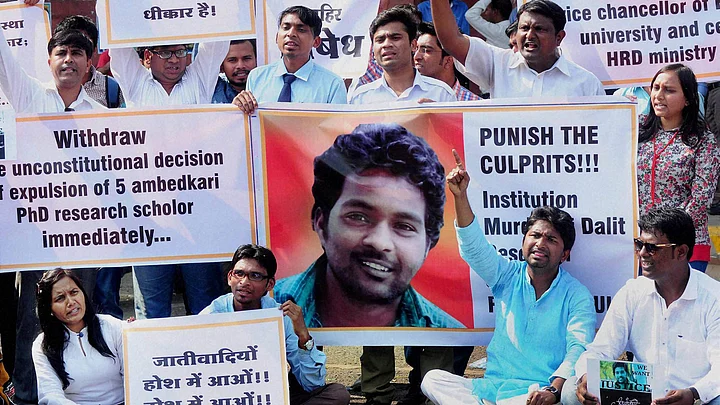After the Union Ministry of Information and Broadcasting denied censor exemption to a film on Hyderabad university PhD scholar Rohith Vemula – who committed suicide in January 2016 – the filmmaker has made the film available online.
Titled ‘The Unbearable Being of Lightness’, a play on Milan Kundera's novel ‘The Unbearable Lightness of Being’, the Vemula documentary is among the three films which have been barred from being screened at the upcoming International Documentary and Short Film Festival of Kerala because of the I&B ministry's decision.
Vemula, a Dalit scholar and a student activist of the Ambedkar Student Organisation (ASA), hanged himself last year. His death rocked the nation and put the spotlight once again on institutionalised caste discrimination, especially in campuses, and the plight of students from marginalised communities.
Filmmaker Ramachandra PN's documentary is set in the aftermath of Vemula's death, when the students had ended the boycott of classes. Ramachandra had gone to the university to conduct a documentary filmmaking workshop and the participants were asked to observe a popular space called Shopcom in the campus and describe what they saw. Shopcom is of significance because it's not only a hangout area for the students but also the epicenter of the Vemula protests.
So, even as participants read out mundane details (their accents capturing the diversity of the class) that caught their eye while filming, Vemula is almost never out of the frame. He's become part of the landscape, with posters and paintings on the wall and his smiling bust reminding the viewer that what goes on around us is never free of subtext.
The participants of the workshop also report snatches of conversations that they overhear – from students discussing romantic crushes to serious political discussions centered on Vemula's death.
Also Read: Rohith Vemula Death: HRD Min Rejects RTI Seeking to Share Report
The footage is interspersed with verses from Intisaab (sung by Hirawal group) written by revolutionary poet Faiz Ahmad Faiz. Although Faiz wrote the song in a different context, the lyrics lamenting the sorrow of a nation is eerily befitting to the film.
We hear Vemula's own words from the damning letter that he wrote before committing suicide, speaking of his dreams and ambitions and how he was never allowed to be more than his caste identity – “My birth is my fatal accident,” as he put it. Actor Saumesh Bangera reads out the letter which unleashed the pent up anger that is common yet invisible in society.
The BJP government at the center, with Smriti Irani heading the HR ministry, tried to quell the protests that broke out by casting aspersions on Vemula's caste identity. How could Vemula be a Dalit when his father was not one – was the question raised. The film shows portions of the brilliant article titled Rohith Vemula – an Unfinished Portrait written by journalist Sudipto Mondal which went back to Vemula's childhood and upbringing, probing what it meant to be seen as a Dalit and to grow up as one.
Also Read: A Year on, Rohith Vemula Case Held up by Confusion Over Caste
The 45-inute documentary captures protests too, but as an observer and not participant. The uncomfortable camera angles and shaky focus are deliberate - this is not a film you’re meant to sit back and watch.
(This article was originally published on The News Minute.)
(At The Quint, we question everything. Play an active role in shaping our journalism by becoming a member today.)
